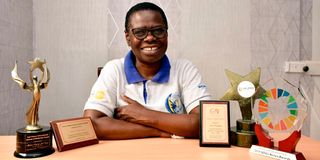From one girl's pain to 3,000 lives saved; Jane Anyango's legacy of hope

.Polycom Girls Founder Jane Anyango poses for a picture with her awards after the interview at her office in Kibera on October 16, 2024. Francis Nderitu | Nation
What you need to know:
- Jane Anyango transformed her bedroom in Kibra into the headquarters of Polycom Girls, an entity she founded after sheltering an 11-year-old victim of sexual abuse.
- Despite facing personal tragedies, she pioneered innovative programs like the 'Talking Boxes' initiative in 50 schools and built a network of 550 volunteers who provide menstrual health resources to over 3,000 young people annually.
- Now in her 50s, she is preparing to hand over leadership to the young women she has mentored, leaving behind a powerful legacy of grassroots activism.
As we enter Jane Anyango’s office in Kibra, Nairobi County, we are enveloped in an atmosphere rich with warmth and compassion. Sunlight spills through the window, casting golden rays that dance across the room, highlighting the simplicity of her surroundings.
“You're actually sitting in my bedroom,” Jane says, her smile radiating kindness as we settle in for our interview.
Jane is the visionary founder of Polycom Girls, an organisation that began with a focus on uplifting young girls but has since expanded its reach to include boys, recognising their struggles as well.
This, however, was not a path she had ever envisioned for herself.
Her journey into advocacy began from the shadows of personal trauma. In 2003, she took in an eleven-year-old girl who had been horrifically exploited by a 39-year-old man masquerading as her boyfriend.
During quiet moments, as the girl gently styled Jane’s hair, she became a confidante, inviting the child to share her heart's deepest scars. The disgust etched on the girl's face as she recounted her ordeal struck Jane profoundly, awakening a fierce determination within her.
She couldn’t help but see reflections of this child’s pain in her own daughters, and a vow took root in her heart: to protect and empower other girls from falling victim to similar violations.
“I turned wild,” Jane recalls passionately, “talking to girls everywhere about how to safeguard themselves against sexual advances and abuse.”
Little did she know, her grassroots efforts were creating ripples of hope, and girls began to confide in her, seeking her guidance.
To cultivate a network of empowering women, Jane formed a self-help group, envisioning a sanctuary where girls in the neighbourhood could speak openly about their experiences. Despite the enormity of her vision, she initially saw her work as saving one girl at a time; the thought of formalising her efforts into a structured organisation had yet to cross her mind.
In the midst of managing her secretarial bureau in Kibra, an unexpected opportunity arose in December 2007, when she stumbled upon a conference call for grassroots women’s rights defenders organised by a United Nations entity.
Seizing the moment, she registered for the event, joining others who shared a commitment to channelling their voices against violence.
At the conference, Jane felt somewhat out of place, as discussions centred around sexual violence and HIV/Aids, while her heart yearned to address one fundamental question: “Who is looking after my girls? Are they truly empowered to shield themselves from violence?”
Her return home ignited a fire within her; she began visiting schools, sharing her knowledge with girls, and galvanising them to stand strong.
However, during the chaos that erupted in late 2007 into 2008, Jane faced a tragedy that would haunt her. One of the girls she had nurtured lost her life to gunfire during a police crackdown, a heart-breaking event that propelled Jane and a fellow advocate to organise a demonstration against the police.
From those humble beginnings, they gathered in an open field — now the site of the Kibra deputy county commissioner's office — where up to 800 women began to meet every Saturday.
They shared their burdens and fears, all the while building a sense of community. When attendance dwindled, they experimented with football and self-composed songs, using music as a means of expression.
Recognising the need for a broader impact, they transformed their self-help group into a community-based organisation, naming it Polycom Development Project, signifying many pathways to community development.
With a vision for greater outreach beyond Kibra, the initiative evolved into a national non-governmental organisation in 2022, becoming Polycom Girls.
Jane’s influence has since blossomed from empowering a single girl to touching thousands of lives across various counties such as Nairobi, Kitui, Homa Bay, Meru, Bomet, and Kilifi. Her entity distributes more than 3,000 sanitary towels annually and conducts training sessions for girls and boys on menstrual hygiene management. Their mentorship program, Gpende, promotes self-love and resilience.

Jane poses outside her office in Kibera on October 16, 2024 after the interview.
The organisation thrives on the support of 500 female and 50 male volunteers, many of whom were once beneficiaries of Jane's work themselves. Together, they provide vital psycho-social support to more than 3,000 young people each year.
To empower the teenagers to voice their experiences of violence, they initiated a project called Talking Boxes, a discreet receptacle placed in all 50 partner schools across Nairobi and Homa Bay counties.
While intended for girls to express their concerns anonymously - be it about sexual harassment, menstrual health, or social issues - the boys soon followed suit, revealing their own cries for help.
“When boys write in, you know it’s serious,” Jane remarks, recalling instances where boys disclosed harrowing tales of abuse.
Yet, her journey has not been without heartache. One particularly haunting experience involved a girl who had been systematically abused by her stepfather. When the girl bravely confided in her mother, she was dismissed, sent away to her grandmother, and further shamed at school.
Jane too, faced systemic challenges when she attempted to gain medical support for her. Later, her mother took her, and to this day, she still doesn’t know her whereabouts.
In addition to the usual financial challenges faced by women's rights organisations, Jane has encountered life-threatening situations due to her advocacy work.
In 2021, her home was raided nearly two years after the 25th anniversary of the International Conference on Population and Development, Program of Action in Nairobi, in which she participated.
During the conference, they were given Johari Beads as a commitment to ending female genital mutilation, and they were to deliver them to the then Deputy President, William Ruto. She, among other women, took a photo with Ruto, and the women were unhappy, which led to the raid on her home.
They accused Jane of aiding actions that cannot be mentioned in this article since they are defamatory. During this period, Jane was still mourning two precious people in her life: her mother, who had died in 2018, and then, the following year, her husband.
When the raiding was happening, she was in the village burying her father-in-law. Her 17-year-old son was in the house, and thanks to the neighbours who came to chase away the raiders, Jane cannot imagine the worst that could have happened to her son.
“I was out there helping girls and smiling all the way, but deep inside of me, I was dying,” she says.
She had to relocate as her four children were badly traumatised.
The saddest moment, though, was when she reached out to other women’s rights organisations to condemn the attack, and they declined on the grounds that it portrayed women badly as their own enemies.
Only two international organisations condemned the incident.
All in all, Jane has remained steadfast in her work, winning several awards and recognition, the most recent one being the Safecity – Collective Action Award by the US-based non-governmental organisation Vital Voices Global Partnership, which she received last May at the John F Kennedy Centre for the Performing Arts in Washington, DC.
At the end of this year, Jane will exit from Polycom with her head held high and a legacy stretching all the way.
“I have really worked so hard, and it’s time for me to exit the stage and allow the young people to lead,” says Jane, who is in her 50s.
As she plans to exit to explore “many opportunities out there,” she is effortlessly seeking enough money for the organisation to remain stable and continue to offer their services.
She envisions seeing the organisation spread its wings to the global stage.
“I’m happy that I’m handing over the leadership to the young women I have mentored throughout the years. How exciting can that be! And I encourage them to keep on going. The future is bright,” says Jane, who has no higher education.

Marline Ochieng' during an earlier interview at Polycom Girls office in Kibra, Nairobi County, on October 7, 2024.
The marvellous achievement she has made without a university or college education is what inspires Marline Ochieng’. The 24-year-old hasn’t progressed to higher education due to a brain tumour that affected her performance in high school.
She joined Polycom after she cleared high school in 2016, where she was mentored by Jane and continued to volunteer with the organisation.
Last year, she founded An Jaber, which translates to “I am beautiful” in Dholuo. The community-based organisation seeks to instil self-acceptance and confidence in young women like herself.
“I was afraid I’d be offending Mom Jane if I told her I had a burning idea to start my own organisation, but I did it because although I had the idea, I was clueless about how an organisation is run,” says Marline.
“To my surprise, she was like, ‘Go for it, my daughter. Even if you are clueless, do it. You’ll learn along the way.’ And here I am. I have not gone to university, but for sure I’ll make it like Mom Jane. She inspires me. She is my model.”





